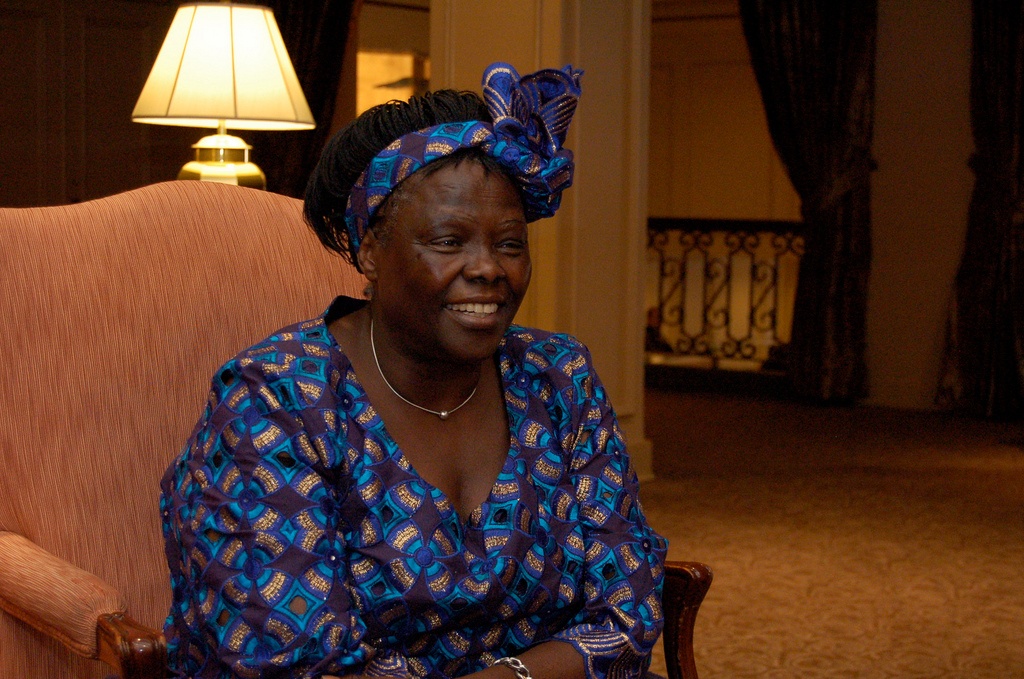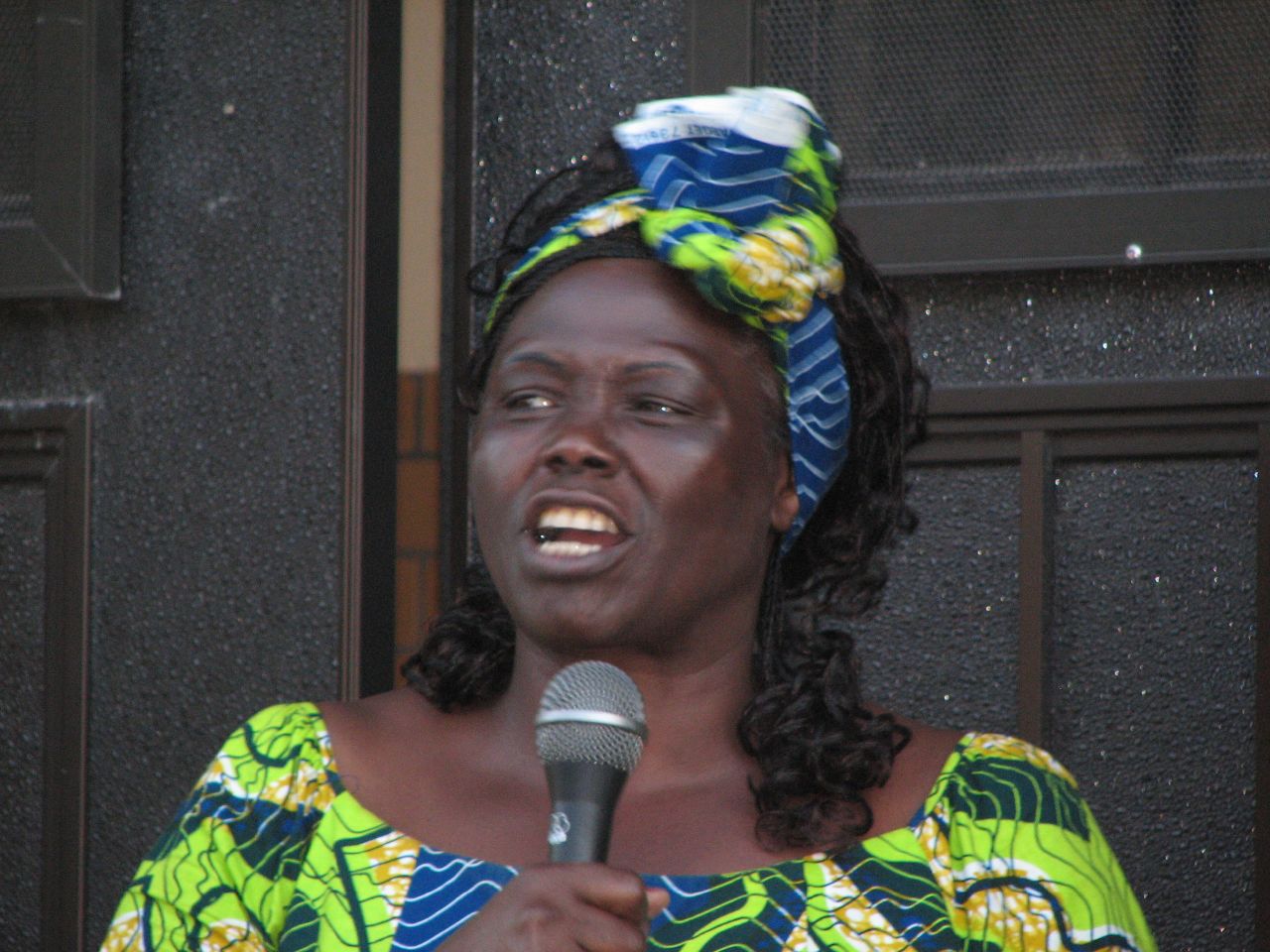Herstory: Wangari Maathai, An Advocate Of Democracy, Peace And The Environment
 Contributed by
Michaela Anchan
January 3, 2016
Contributed by
Michaela Anchan
January 3, 2016

Political activist and environmentalist Wangari Maathai was an inspiring woman with an incredible dedication to all the worthy things: learning, family, her country and our planet.
Maathai was born in Kenya on April 1, 1940 to a Kikuyu (ethnic group) family. She had an excellent Catholic education, finishing top of her class, and was selected to be part of an educational program in the US in 1960.
Maathai received her B.S. Biology with a Minor in Chemistry degree in 1964 and completed a master’s in 1966. After graduation, she landed a position as a research assistant to a zoology professor back home, at the University College of Nairobi.
Maathai returned to Kenya only to find out that the position offered to her was given to another person, most likely due to tribal and gender bias. After two months of job searching, she was offered another research assistant position at the University College of Nairobi’s Department of Veterinary Anatomy (School of Veterinary Medicine).
These were busy and productive times for Maathai: she met her future husband Mwangi Mathai, was involved in opening a general store where her sisters worked at the time, and traveled to Germany to pursue a doctorate degree. Upon her return to Nairobi in 1969, she became an assistant lecturer at the University College of Nairobi, was married and became pregnant with their first child. Her husband ran for a Parliament seat but lost.
At this time, the founder of the program that allowed her to study abroad was assassinated and this event prompted President Kenyatta to end Kenya’s multi-party democracy. Her eldest son, Waweru, was born soon after this.
Maathai became the very first doctorate degree holder among East African women in 1971 with a degree in veterinary anatomy, obtained from the University College of Nairobi. In the same year, her daughter, Wanjira, was also born. A third child, Muta, followed in 1974.
Apart from being a lecturer at the University, Maathai also actively campaigned for women to have equal benefits in the same school, with many of her demands seeing successful results after negotiations. She was also involved in many civic and sociopolitical organizations, such as the Kenya Red Cross (serving as director in 1973), the Kenya Association of University Women (member), the Environment Liaison Center (she eventually became the board chairman), and the National Council of Women of Kenya (member). Through her involvement in these associations, she came to see that much of Kenya’s problems were deeply rooted to environmental degradation.
With her husband finally winning a seat in Parliament in 1974, she was able to push for more environmental initiatives that resonated his stance of solving the unemployment problem. Through her work, she was even able to attend the first UN conference on human settlements in June 1976.At the conference, her proposal, the tree-planting “Green Belt Movement”, was born.
Maathai separated from her husband in 1977, and he filed for divorce in 1979, claiming that she was too strong-minded and he was not able to control her. Accusations were filed later on, with him calling her “cruel” and accusing her of adultery. Unfortunately, the judge ruled in his favor. Maathai even spent a few days in jail after a remark she had made about the judge being incompetent. All this resulted in her adding an extra ‘a’ to her surname to differentiate from Mathai, who had demanded she stop using his. Financial problems also arose because of the divorce, and she was left with no choice but to have her children live with her ex-husband as she was unable to bring them with her due to the nature of her work.

More problems arose in the sphere of work and politics, with Maathai losing several elections for the position of chairman of the National Council of Women of Kenya because of the meddling of Kenyan President, Daniel arap Moi. By the time she was finally elected chairman, support was withdrawn from the NCWK until it became nearly bankrupt. Still, she served as chairman until her retirement in 1987. She also tried to run for Parliament, but more problems resulted in her being disqualified. As she had to resign from her job to run, she found herself evicted and unable to live in the University housing because she no longer worked at the University.
During the later years, she concentrated on the Green Belt Movement, which partnered with international organizations. This resulted in good funding and, overall, the Green Belt Movement was able to plant more than 30 million trees, as well as provide nearly 30,000 women with decent livelihoods. From there, she continued to be more active in the sphere of environmental protection and women’s rights as her network grew to even greater international heights. Clashes with the government were many, with Maathai beaten and bloodied by government cohorts, an assassination list that included her name, and unjust jailing. She underwent a hunger strike after this, and further earned the ire of the President, who had forcibly removed her from the site (among others). The international community recognized Maathai and she received the Goldman Environmental Prize (1991), and the Hunger Project’s Africa Prize for Leadership, in London.
Kenya experienced a series of ethnic clashes in 1992, which prompted Maathai to push even further for democracy and peace in elections. With the government after her, she resorted to hiding from her detractors. She continued to receive many awards citing the good she had done in the name of the environment and humanity. In the early 2000s, Maathai worked as a faculty member at Yale University, expanding on her Green Belt Movement project. Her return to Kenya in 2002 saw her winning a seat at Parliament under the National Rainbow Coalition. Because of her steadfast commitment and astounding work for the environment, she was awarded the Nobel Peace Prize in 2004 for contributing to “sustainable development, democracy, and peace”.
Her later life saw the following achievements: becoming the president of the Economic, Social and Cultural Council of Africa (2005), a goodwill ambassador for the protection of the Congo Basin Forest Ecosystem (2005), a flag bearer at the Winter Olympics (2006), an honorary doctorate from Connecticut College (2006), founder of the Nobel Women’s Initiative (2006), and being named as the first peace hero by PeaceByPeace.com (2009). She also served on the Association of European Parliaments with Africa’s Eminent Advisory Board until her death from ovarian cancer on September 25, 2011.
For all her efforts in saving the environment, as well as advocating for peace and democracy, Wangari Maathai is indeed deserving of the overwhelming amount of accolades and awards she received throughout her lifetime, as well as posthumously. Her efforts will be felt by later generations who will hopefully continue her legacy in caring for the earth and working for harmony among people.
Visit Woolf Works page to find out more about the Coworking space.












Sorry, the comment form is closed at this time.